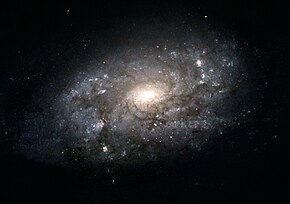NGC 3949
 From Wikipedia the free encyclopedia
From Wikipedia the free encyclopedia
| NGC 3949 | |
|---|---|
 A Hubble Space Telescope (HST) image of NGC 3949 | |
| Observation data (J2000 epoch) | |
| Constellation | Ursa Major |
| Right ascension | 11h 53m 41.7204s[1] |
| Declination | +47° 51′ 31.344″[1] |
| Redshift | 800 ± 1 km/s[1] |
| Distance | 48.6 ± 3.5 Mly (14.89 ± 1.06 Mpc)[1] |
| Apparent magnitude (V) | 11.5[1] |
| Characteristics | |
| Type | SA(s)bc[1] |
| Size | ~47,800 ly (14.66 kpc) (estimated) |
| Apparent size (V) | 2.9′ × 1.7′[1] |
| Other designations | |
| UGC 6869,[1] PGC 37290[1] | |
NGC 3949 is an unbarred spiral galaxy in the constellation Ursa Major, approximately 50 million light-years away from the Earth. It was discovered by German-British astronomer William Herschel on 5 February 1788.[2]
NGC 3949 is a member of the M109 Group, a group of galaxies located in the constellation Ursa Major that may contain over 50 galaxies. The brightest galaxy in the group is the spiral galaxy M109.[3][4][5]
One supernova has been observed in NGC 3949: SN 2000db (type II, mag. 14.3).[1][6]
References
[edit]- ^ a b c d e f g h i j "NASA/IPAC Extragalactic Database". Results for NGC 3949. Retrieved 2006-11-16.
- ^ Seligman, Courtney. "NGC 3949". Celestial Atlas. Retrieved 9 August 2024.
- ^ R. B. Tully (1988). Nearby Galaxies Catalog. Cambridge: Cambridge University Press. ISBN 978-0-521-35299-4.
- ^ A. Garcia (1993). "General study of group membership. II - Determination of nearby groups". Astronomy and Astrophysics Supplement. 100: 47–90. Bibcode:1993A&AS..100...47G.
- ^ G. Giuricin; C. Marinoni; L. Ceriani; A. Pisani (2000). "Nearby Optical Galaxies: Selection of the Sample and Identification of Groups". Astrophysical Journal. 543 (1): 178–194. arXiv:astro-ph/0001140. Bibcode:2000ApJ...543..178G. doi:10.1086/317070. S2CID 9618325.
- ^ "Transient Name Server". Entry for SN 2000db. Retrieved 9 August 2024.
External links
[edit] Media related to NGC 3949 at Wikimedia Commons
Media related to NGC 3949 at Wikimedia Commons